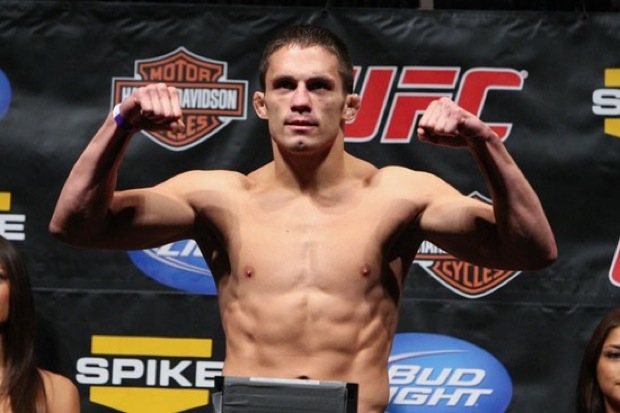The next three years would have its ups and downs for Ellenberger, tasting both victory and defeat while continuing to work on his game. As he skipped around to several organizations, he kept his eyes on the sport’s biggest stage. When the call finally came from the UFC, it was an opportunity he couldn’t pass up.
“I kind of knew what it was going into that fight with Condit. My manager Monte Cox called me three weeks before the fight and told me we had an opportunity in the UFC. Regardless of what I think happened or if I feel that I won, the judges saw it differently that night.
“To be honest I’m actually kind of glad things worked out that way because it gave me a new perspective. It really motivated me to work harder. You can’t be a part time fighter, and you learn that very quickly at this level. It has to be your life. After I lost that fight I refocused and here I am. It’s definitely been a crazy two years.”
In the aftermath of his bout with Condit, the loss wasn’t the only issue on Ellenberger’s mind. Things came to a sudden halt when his brother Joe was diagnosed with a rare blood disorder. PNH (paroxysmal nocturnal hemoglobinuria) is a blood disease which causes bone marrow to produce red and white blood cells that lack a specific protein code. This causes the body to treat the blood cells like bacteria and attack otherwise healthy cells.
The issue of his brother’s illness has created an emotional storm of hardship and inspiration.
“He’s been through so much adversity and it’s been extremely hard on me and my family,” Ellenberger said. “Without him I wouldn’t be in this sport. He showed me how to compete and how to win. It’s a hard thing to deal with, but he still trains with me and pushes me to be better. Our relationship is very important to me and it makes me want to work harder.”
“He’s really an inspirational part of my life. The way I see him go through things motivates me to work harder than I ever have. There is a lot of anger, frustration and different emotions I feel because of it. My family goes through those as well. I find a way to turn all of that into something positive. It’s given me a different perspective on life in general.”
****
It was during this period when Jake realized the changes he needed to make. He contacted Riley Ross to become his strength and conditioning coach. Together, they set about implementing the tools for Jake’s improvement. Since Ross was also working with his brother, he saw firsthand how Joe’s illness affected Jake.
“The funny thing about Jake and Joe is their answer to everything has always been to just work harder. You put in the time and effort and things will work out. It’s a part of that Midwestern work ethic that makes a lot of fighters out of this region great. The issue with Joe is that nobody knows how to deal with it. I spend more time with him than probably anyone, and the medical community is just stumped by it. Most people with his condition, doctors are concerned with helping them get out of bed and make it through the day. In Joe’s case he is training and trying to break into the UFC.
“The hardest thing for Jake is control. They both feel that there is always something that can be done about any situation. Right now with Joe there are a lot of intangibles. And for Jake it’s difficult because he doesn’t know what is going to make it better. Nobody knows. The biggest thing is that we spend a lot of time praying and believing in Joe. It’s something that drives Jake on a very deep level. Jake wants to do great for his family but I truly believe he wants to succeed for Joe.
“Jake loves his brother, and it’s hard for him to see a guy who has always been in better shape than everybody else have to go through this. It’s a really tough thing for their family but it has brought them so much closer together. Their family’s faith and bond has been amazing.”
[page prev=”Growing up blue-collar” next=”Getting ready for Diego Sanchez”/]

Comments
The Fighting Life: Jake Ellenberger